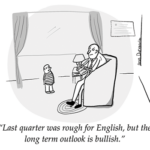📌 We were off last week, so this week’s edition includes some older items. 📌
In this week’s newsletter: Schools battle chronic absenteeism. Behind the scenes of the prolonged Portland teachers strike. How single-family zoning exacerbates school inequality. The top education podcasts of the year, according to Time, the New Yorker, and Apple. And student journalists show us how to avoid “bad news burnout.”
BATTLING ABSENTEEISM
The big story of the week
The big education story of the week is the effort to combat widespread student absenteeism, which is attracting attention from both education outlets and general-interest publications (Washington Post, Chalkbeat Colorado, Chalkbeat Detroit, GBH Boston, Axios, DCist, Dallas Observer, Maine Press Herald).
Some states and districts have already implemented programs, while others are just now embarking on new efforts (News8 Connecticut, Boston Herald). Some of the efforts being depicted are system-wide, while others are school- or classroom-level (Washington Post, The 74). At least one Massachusetts school has bucked the trend. But some districts have a long way to go. In Milwaukee, research has identified nearly 1,000 students who haven’t attended any school this year (Boston Globe, Urban Milwaukee).
While the highest levels of student absenteeism may have subsided from two years ago, available evidence suggests rates are still much higher than before the pandemic.
Other big education stories of the week:
📰 PORTLAND STRIKE ENDS: The teachers strike in Portland is over and kids are back in the classroom this week after 11 days of lost instruction spanning nearly a month (Willamette Week, Oregonian, New York Times, AP). The deal the teachers union reached with the district has brought new attention to local union head Angela Bonilla and left some teachers and families frustrated (Oregonian, OPB, Willamette Week). The 74’s Beth Hawkins observed that the outcome — not much more money than at the outset, fractured relations with the union, and parent upset over makeup days — mirrors recent events in Minneapolis. See the best story of the week for more.
📰 CELL PHONE BANS EXPAND: School cell phone bans are coming to six public schools in Richmond, Va., following concerns about student safety and mental health (Richmond Times-Dispatch). Social media and its harm to kids is a big theme in the coverage, along with classroom disruption (New Hampshire Bulletin, EdWeek). Legislators and editorial pages are weighing in (EdWeek, Washington Post). But not all of the coverage has received admiration. A New York City assistant principal criticized a recent New York Times story for its eerily negative coverage of one school’s experience (The Grade).

BEHIND THE SCENES IN PORTLAND
The best education journalism of the week
The best education story of the week is Julia Silverman’s Oregonian story Portland teachers strike: Fallout and finger-pointing after contract settled.
There are three main strengths to the piece:
1: It features a clear-eyed assessment of the deal won by the teachers: “significant” gains on elementary and middle school teachers’ planning time, “modestly larger” cost-of-living raises, and no headway on class size limits or most other union requests.
2: It explains how the final deal differs from the district’s pre-strike offer, examining results rather than relaying each sides’ press statements.
3: It unpacks some of what happened among educators and union officials, including the resignation of the longtime teacher bargaining leader.
While it lacks similar insight into the board negotiating team’s efforts, this is a standout example of what deeply sourced education reporting can do.
Other stories we liked — and what we liked about them:
👏 Alex Zimmerman takes a critical look at the implementation of NYC’s literacy overhaul, focusing on teachers’ concerns about inadequate training and support (Chalkbeat New York). Hopefully soon we’ll see similar reporting from a student-centered angle.
👏 Core classes separated by race that kids can volunteer to take are the subject of this Sara Randazzo and Douglas Belkin piece comparing a program at a suburban Chicago district to similar ones across the country (Wall Street Journal). It’s an illuminating follow-up to previous reporting about “tracking” in core classes.
👏 Migrant children in NYC learn English through song and play in this student-centered story from Karen Yi about how the city’s growing newcomer population is catching up in the absence of a districtwide bilingual program (Gothamist).
👏 This brief but discomfiting piece from Sharon Lurye and Charles Lussier about “off-the-grid” schools in Louisiana starts with a powerful anecdote and serves as a warning to parents and an indictment of traditional school systems (AP/The Advocate).
👏 Martha Harris’s short profile of a literacy coach in Utah provides on-the-ground detail about how literacy coaches help school systems improve instruction — a much-needed complement to coverage of reading writ large (KUER).
SINGLE-FAMILY ZONING & SCHOOLS
Our latest columns and commentary
While it’s an increasing focus of attention and concern, single-family zoning restrictions — sometimes called “exclusionary zoning” — have not gotten as much attention as they warrant from education reporters and outlets, argues Richard Kahlenberg in this week’s column, Single-family housing and education.
Zoning policy is education policy, according to Kahlenberg, a scholar who’s spent decades researching ways to support diverse and equitable schools. “The next time a residential zoning fight erupts in a community, education reporters should tune in.”
ICYMI: What parents really want, our previous piece, describes the frustrations that parents in Boston and elsewhere have with traditional news being offered to them.

Above: The New York Times Hannah Dreier (right) won a 2023 Freddie Reporting Award from the National Press Foundation for her reporting on migrant kids.
PEOPLE, JOBS
Who’s going where and doing what
🔥 Career moves: The 74 publisher Jim Roberts is stepping down, with editor-in-chief Steve Snyder stepping into the new role of CEO. Former all-star Seattle Times education reporter Claudia Rowe is back at the paper on the opinion page, with a recent piece here on student discipline. Former Texas education reporter Lauren McGaughy has started her new gig as an investigative reporter and editor for KUT Austin. Former LAist education reporter and current Minnesotan Kyle Stokes is joining Axios Twin Cities to report on local government and more. And former Connecticut education reporter Jacqueline Rabe Thomas is back at Hearst CT after maternity leave. Congrats to all!
🔥 Kudos: Reporting by Chalkbeat Tennessee’s Laura Testino got a shoutout in this New Yorker essay by Robert Samuels, co-author of a book about George Floyd that was censored at a high school.
🔥 Soundoff:
“Over the past couple of years, both the left and the right have just gone a bit overboard when it comes to focusing on [school culture war] issues,” says Republican operative Alex Stroman in a recent Politico piece.
“If Betsy DeVos had tried to quote FDR or JFK to score a political point and wound up fabricating history, the WaPo and NYT would’ve been all over it for days,” quipped AEI’s Rick Hess about Education Secretary Miguel Cardona misusing a Ronald Reagan quote.
“It’s too bad that the Times’s ‘first draft of history’ didn’t offer a more balanced look,” writes Grade contributor Michael Petrilli in a Fordham Institute critique of the Times’ recent story about why the College Board is looking to expand Advanced Placement. He’s also taken aim at the Times’ coverage of state civic standards.
🔥 Job openings: The 74 is now looking for a new editor-in-chief. The St. Louis Post-Dispatch is hiring a “hard-charging reporter to help us cover the rapidly changing field of education.” See past editions of the newsletter for more jobs that may still be open.

Above: With this jealousy-inspiring gif, The 74 named the NBC News podcast “Grapevine” among the top stories it wished it had published in its annual jealousy list.
APPEARANCES, EVENTS, & NEW RESOURCES
What’s happening and new research
⏰ Top podcasts: Time magazine named “Sold a Story” and “ParentData With Emily Oster” as two of the top 10 best podcasts of the year. The APM Reports hit also got a nod from Apple Podcasts on its list of most-shared shows and episodes of the year. The New Yorker named “Grapevine” and ProPublica and Serial’s “The Kids of Rutherford County” in its top 10 list.
⏰ Segments, podcasts, & appearances: “In June, I and my colleagues survived a shooting at one of the most unlikeliest places — a high school graduation,” tweeted the Washington Post’s Moriah Balingit about the Post’s three-part podcast series “Surviving to Graduation.” Over the past two weeks, Chalkbeat’s Kalyn Belsha appeared on WBUR Here & Now to talk about how schools are responding to the rise in anti-Semitism and Islamophobia. WBUR On Point featured a segment on teaching media literacy to children. And “All Of It with Alison Stewart” interviewed the creator of the one-person show “School Pictures,” inspired by the stress of NYC high school admissions.
⏰ ICYMI: The Suburban Schools, Urban Realities conference took place this week with 25 scholars on suburban education and an interview with the New York Times’ Erica Green. EWA hosted a webinar on chronic absenteeism, featuring Chalkbeat Detroit’s Ethan Bakuli, USA Today’s Nirvi Shah, Voice of San Diego’s Jakob McWhinney, and the AP’s Bianca Vázquez Toness, among others.
⏰ Fact check: “No single book she cited was banned statewide,” writes PolitiFact’s Jeff Cercone about the singer Pink’s claim about book bans in Florida. “We don’t see any records of Florida schools removing three of the titles Pink listed [“A Catcher in the Rye,” “1984,” or “Girls Who Code”].” And in the wake of the November elections, Ballotpedia is reminding folks that in many school board races, candidates with no political party affiliation or endorsement won the most seats, but headlines don’t necessarily reflect that. “Depending on the article, you can walk away believing conservative or liberal candidates won the day.”
⏰ Research: A new study published in the journal JAMA Pediatrics shows that most school shootings are not mass killings, and they’re often driven by community violence, reflecting broader patterns of gun violence in society. According to the World Bank, every year of education a person has leads to a 10% rise in annual earnings. And lastly, “The Indicator from Planet Money” dives into the research on school vouchers, concluding “what may feel better may not have much of an effect.”
THE KICKER

That’s all, folks. Thanks for reading!
Reply to this email to send us questions, comments or tips. Know someone else who should be reading Best of the Week? Send them this link to sign up.
Using Feedly or FlipBoard or any other kind of news reader? You can subscribe to The Grade’s “feed” by plugging in this web address: http://www.kappanonline.org/category/the-grade/feed/.
Read more about The Grade here. You can read all the back issues of The Grade’s newsletter, Best of the Week, here.
By Alexander Russo with additional writing from Colleen Connolly, Will Callan, and Greg Toppo.
ABOUT THE AUTHOR

The Grade
Launched in 2015, The Grade is a journalist-run effort to encourage high-quality coverage of K-12 education issues.













